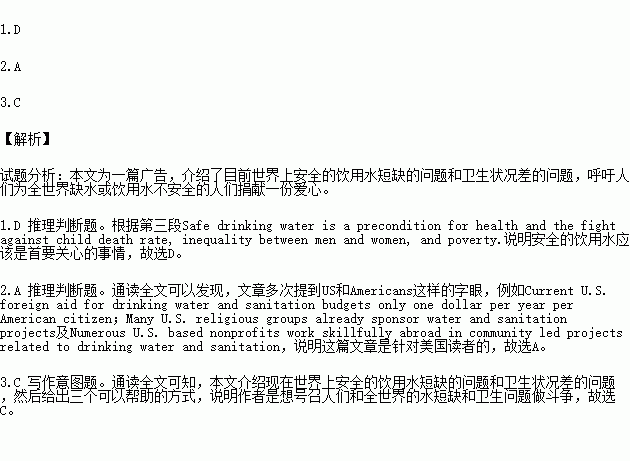题目内容
“I THIRST”
Each day water-related diseases kill 3,900 of the world’s children.
Across the world, 1.1 billion people have no access to clean drinking water. More than 2.6 billion people lack basic sanitation (卫生设备).
The combination proves deadly. Each year, diseases related to inadequate water and sanitation kill between 2 and 5 million people and cause an estimated 80 percent of all sicknesses in the developing world. Safe drinking water is a precondition for health and the fight against child death rate, inequality between men and women, and poverty.
Consider these facts:
* The average distance that women in Africa and Asia walk to collect water is 6 kilometres.
* Only 58 percent of children in sub-Sharan Africa are drinking safe water, and only 37 percent of children in South Asia have access to even a basic toilet.
* Each year in India alone, 73 million working days are lost to water-borne diseases.
Here are three ways you can help:
1) Write Congress
Current U.S. foreign aid for drinking water and sanitation budgets only one dollar per year per American citizen. Few members of Congress have ever received a letter from voters about clean drinking water abroad.
2) Sponsor a project with a faith-based organization
Many U.S. religious groups already sponsor water and sanitation projects, working with partner organizations can make safe water a reality for thousands of people.
3) Support nonprofit water organizations
Numerous U.S. based nonprofits work skillfully abroad in community led projects related to drinking water and sanitation. Like the sample of non-profits noted as follows, some organizations are large, others small-scale, some operate world-wide, others are devoted to certain areas in Africa, Asia, Latin America. Support them generously.
1.The three facts presented in the passage are used to illustrate that ______.
A. poverty can result in water-borne diseases
B. people have no access to clean drinking water
C. women’s rights are denied in some developing countries
D. safe drinking water should be a primary concern
2.The intended readers of the passage are _______.
A. Americans B. overseas sponsors
C. Congressmen D. U.S. based water organizations
3.The main purpose of the passage is to call on people to ______.
A. get rid of water-related diseases in developing countries
B. donate money to people short of water through religious groups
C. fight against the worldwide water shortage and sanitation problem
D. take joint action in support of some nonprofit water organizations
 备战中考寒假系列答案
备战中考寒假系列答案
